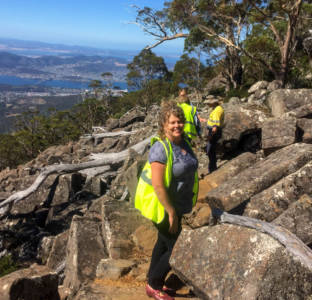Find out more about getting started with 350 Australia, starting a 350 local climate action group, or running a council divestment campaign.
After years working on international campaigns and lobbying politicians, Anna wondered if there was more she could do.
“I got a little sick of telling politicians to take action, and felt that being an influencer wasn’t enough,” Anna said.
So, in 2009 she moved to Hobart and took a job with Bob Brown. She worked with The Greens on a number of projects, but primarily on their climate change package with the Labor Party. Shortly after, she got into local government and ran for Mayor. We spoke to Anna about her views on climate change, and how she’s making a global impact from a city level.
Think global, act local
“One of the reasons I was most inspired to run for local government was because I was starting to feel a little uninspired, worried and concerned about the lack of action on climate change,” Anna said.
“[Working at an international level] can be frustrating because you never actually know if what you advocate is implemented, and you’re working at a level people can’t really grasp onto. By the time I started working in local government I was ready to do something on the ground.”
For Anna, working at a more local level doesn’t mean forgetting about the bigger picture. In fact, as she explained, it can be quite the opposite, with the global stage providing plenty of inspiration for local change.
“I still operate as, ‘think global, act local’,” she said. “If you look around the world there are amazing things happening at city levels. Some local governments have more power than Australian ones do, and our budgets are not as good as some, but there is still a lot that local governments can do.
“We can respond quite quickly, implement pilots to things and demonstrate how things can be done.”
What’s going on in Tasmania
In 2016, Tasmania became the first jurisdiction in Australia to achieve zero net greenhouse gas emissions. The Tasmanian Government has committed $3 million in funding towards Climate Action 21, a 37-action-point plan aimed at reducing emissions and minimising Tasmania’s contribution to climate change.
This level of commitment has long given Australia’s most southern state a reputation for being more environmentally conscious than the mainland. And while that’s true, Anna explained she believes there is still more to be done.
“Sometimes there can be a view in Tasmania that we don’t need to do much on climate change, because we have a fairly low carbon power sector,” Anna said. “But that’s not good enough, because we know that sometimes Tasmania imports power from the mainland, and our transport sector needs a lot of work.
“The Hobart City Council has done an amazing amount of work in putting solar on lots of lots of buildings and facilities. I believe they need to take the next step and do more work with the commercial and business sector, and also residents.”
For Anna, tackling climate change begins with both improving Hobart’s infrastructure, and fostering greater awareness amongst the members of her community.
“I’ve been focussed the last few years on promoting a more walkable city that’s less car-focussed, and improving public transport.
“Even people who are aware of climate change often have a blind spot when it comes to transport, and perhaps don’t think about reducing their own fuel consumption and that kind of thing.”
Don’t underestimate personal change
“We’ve seen a move away from saying personal action doesn’t matter,” Anna said. “As a politician, it’s good to see the community taking action on things like pushing for more walkable cities, rejecting the idea we need more roads, and pushing for more public transport.
“Politics is still quite divisive on the reforms we need to take, so having the community behind you is really important.”
Understanding that climate change can seem like quite an overwhelming topic, Anna also gave some pointers to what you can do as an individual.
“If [you’re] not feeling inspired or don’t know how to influence climate change, you can start by setting up a local climate action group to lobby your council to bring in best practise for solar initiatives, public transport, green building initiatives, etc.,” she said.
“I would encourage people to do that, because it can make an impact and it feel a bit more satisfying.”
The only way we will see systemic change, is if individuals act. As Anna suggested, that could be by starting a local climate group and taking action!
You could start a council divestment campaign, climate emergency campaign, or support the Global Climate Strike! Find out more about getting started with 350 Australia, starting a 350 local climate action group, or running a council divestment campaign.

